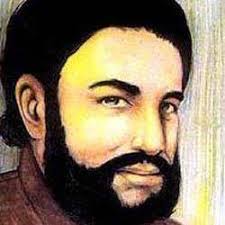Mir Muhammad Taqi Mir (February 1723 - 21 September 1810), also known as Mir Taqi Mir or Meer Taqi Meer, was an Urdu poet of the 18th century Mughal India, and one of the pioneers who gave shape to the Urdu language itself. He was one of the principal poets of the Delhi School of the Urdu ghazal and is often remembered as one of the best poets of the Urdu language. His takhallus (pen name) was Mir. He spent the latter part of his life in the court of Asaf-ud-Daulah in Lucknow. His complete works, Kulliaat, consist of six Diwans containing 13,585 couplets, comprising all kinds of poetic forms: ghazal, masnavi, qasida, rubai, mustezaad, satire, etc. Mir's literary reputation is anchored on the ghazals in his Kulliyat-e-Mir, much of them on themes of love. His masnavi Mu'amlat-e-Ishq (The Stages of Love) is one of the greatest known love poems in Urdu literature. Mir lived at a time when Urdu language and poetry was at a formative stage – and Mir's instinctive aesthetic sense helped him strike a balance between the indigenous expression and new enrichment coming in from Persian imagery and idiom, to constitute the new elite language known as Rekhta or Hindui. Basing his language on his native Hindustani, he leavened it with a sprinkling of Persian diction and phraseology, and created a poetic language at once simple, natural and elegant, which was to guide generations of future poets. The death of his family members,together with earlier setbacks (including the traumatic stages in Delhi), lend a strong pathos to much of Mir's writing – and indeed Mir is noted for his poetry of pathos and melancholy.
NaN
